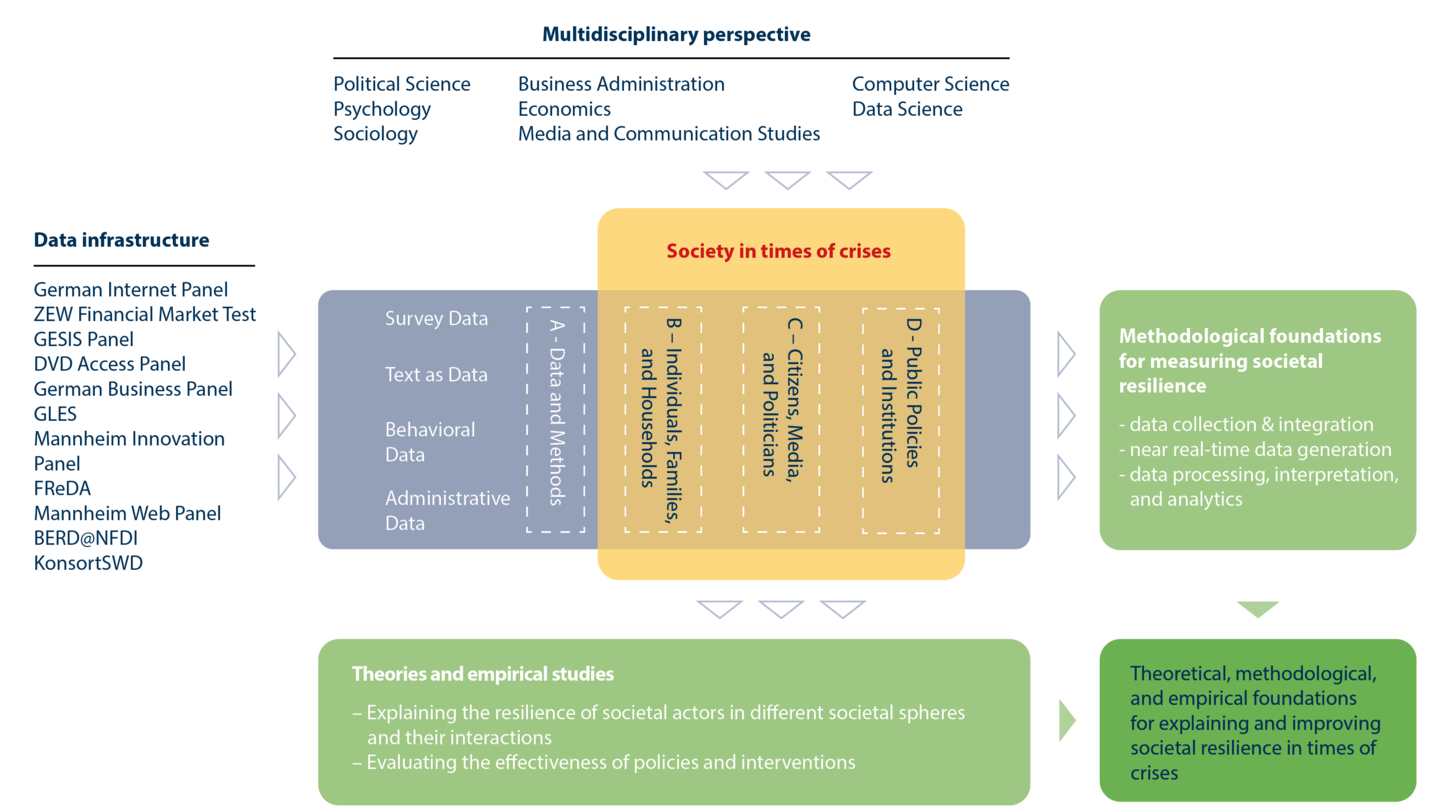Structure
The MCCR is a collaborative platform that combines the substantive as well as data-science and methodological expertise of researchers with the excellent data infrastructure in Mannheim. This rich multidisciplinary scientific environment crystallizes expertise within the MCCR and will enable learning from past crises and developing theories and methods that will allow us to better explain and shape societal resilience in future crises.
Our approach of bringing together excellent disciplinary research and the renowned data infrastructures in Mannheim to study resilience in times of crises is summarized in the following figure:

In our multidisciplinary setup, economic and social science disciplines join forces with computer and data science as well as the excellent data infrastructure in Mannheim to study societal resilience in times of crises. There is a vertical workflow and a horizontal workflow. The vertical workflow represents the goal of our substantive projects in project areas B, C, and D to explain resilience in different societal spheres as well as the effectiveness of policies in times of crises and, in the long run, their interactions that shape societal resilience. The horizontal workflow represents the goal of our methodological projects in project area A to develop innovative methods for data generation and analysis in times of crises that will help study and improve societal resilience in future crises. Ongoing collaborative efforts between the two workflows will fulfill the ultimate goal of the MCCR as depicted in the bottom right corner: creating evidence-based explanations and instruments for improving societal resilience in times of crises.
Partners
University of Mannheim: MZES and MCDS
The MZES conducts social science research with a strong analytical-empirical and comparative focus, contributing to theoretical developments and to substantive knowledge on issue areas related to the one of the MCCR including individual well-being, political extremism, labor market institutions, social inequality, and migration. Collaboration between the MCCR and the MZES will not be limited to substantive issues but will also allow using the expertise and capacity of the Data and Methods Unit of the MZES regarding data generation, management, and documentation.
The aim of the MCDS is to bundle data science competencies as a central facility for method research in the field of collection, processing, and analysis of complex data in the economic and social sciences. This is intended to increase the visibility of existing research in the area, to use synergies, and to avoid redundancies in the acquisition of infrastructure and teaching content. It will also serve to promote interdisciplinary research at the interface between mathematics and computer science on the one hand and economics and the social sciences on the other hand. At the core of the center is interdisciplinary research on topics such as new methods of data collection, statistical modeling, and machine learning in the context of economics and social sciences.
External: ZEW and GESIS
The ZEW and GESIS are ideal external partners for the MCCR due to their respective expertise which will complement the MCCR’s capabilities.
GESIS is establishing a research data infrastructure for digital behavioral data as a second mainstay next to survey data and will particularly promote the linking of digital behavioral data and survey data. Such linking of different data types is at the core of the MCCR’s research strategy.
The ZEW’s expertise regarding politically relevant research and its ample experience in science-based policy advice will help disseminate the MCCR’s findings among political decision makers and thus ensure the impact of the MCCR’s research findings.
Moreover, both the ZEW and GESIS have excellent data generators that can be of great value for researchers of the MCCR. The ZEW runs, for example, the Mannheim Web Panel (MWP), the ZEW Financial Market Test, and the Mannheim Innovation Panel (MIP). Data generators operated by GESIS include the GESIS Panel, the DVD Access Panel, the German Longitudinal Election Study (GLES), and FReDA – The family demographic panel.
